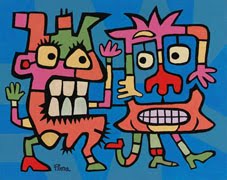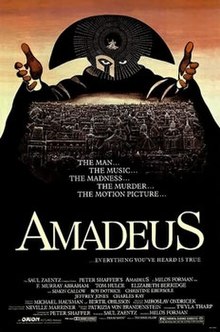 |
Ultimately film may be about money, but magical things can happen
and lives can be changed. |
Pre-ramble
Before I got off (no pun intended) onto the subject of love, I had the intention of blogging about film.
Films are not just mere entertainment to me- I want to get lost into them, losing all sense of time and become deeply involved with the story and the characters. That being said, I also like a good, hokey ride with often outlandish special effects. In other words, you wanna go serious, I can watch some Italian surrealism for two and half hours with the best of them. You like creepy, stupid silly, I'm laughing along with you.
Around Christmas, we had some people over to the house. A person pulled out about 5 DVDs out of my collection and casually stated, "I'm going to borrow these."
While I was boiling inside, I did my best to be polite. You see, there are only a select few I would ever let borrow from my collection. Call it greedy, materialistic or selfish- your words fall on deaf ears. When it comes to my collection, I'm a prick. If I sense you are a person who is going to be meticulous and careful,, then you might get a pass.
One guy at work wanted to borrow my box set of "Band of Brothers." I did my best diplomatic "no." The thought of my collection laying around on someone's floor makes me ill.
"Some of those are not for loaning out, " was my best diplomatic answer. The movies she wanted to rent were given to me and I hadn't watched them anyways. She did borrow "Borat." I told her that she needs to keep it away from the kids and make sure it doesn't get damaged. I'm sure that didn't go down as well as I thought it did, but those discs are my babies and I keep them pristine.
I take films very seriously.
In no particular order, here's a partial list:
Amadeus
It reeks of cliche to state, "This film changed my life," but this three-hour masterpiece reached into me and changed things.
I was going to school at Peabody and my good friend, Bill (an excellent photographer), took me to see what I presumed was going to another "art film." Art films are simply films that try too damn hard to have substance when it's pretty clear that the filmmaker is in love with one of the leads or in love with themselves.
(spoiler ahead)
Watching poor Salieri at the end absolving the inmates of the asylum because he was the "patron saint of mediocrities everywhere" was absolutely unnerving. Who, in the arts, has not tasted jealousy? Only the blindly arrogant.
I ran into some Peabody twit the next day and excitedly asked how he liked the film. His answer was one that matched the heartless, soulless pretentiousness that I encountered on a daily basis at school: "It didn't work," he stated triumphantly and then proceeded to point out historical errors. The idiot has missed the entire point of the film.
This visually sumptuous masterpiece is about how we ordinary people deal with our issues of blatant inadequacy when confronted with great talent, or in Mozart's case, blinding genius. We ask ourselves or God, "Why was so much ability given to this twit when I deserve it so much more?" I have met many a twit with so much natural ability that I had asked myself that question countless times.
Being humble becomes easier when you go to a big university or a small conservatory. It's one thing to be considered to be a good player by your high school peers, but another experience altogether when grouped with people from all over the world in a conservatory. The level you thought you were at (and all of its "specialness") dissipates like the morning fog when you see people doing things so effortlessly that cost you umpteen hours in a practice room just to come close to executing.
Salieri was destroyed by his jealousy. Was I going to let myself be eaten up by the same?
I told Bill on the ride home that Amadeus changed my life. Slowly, painfully and with the grace of time, I learned not to internally wince when someone mentioned how many gigs they had, what show they were doing or how many students they were teaching. I had to let jealousy go. It truly took a lot of time to let go and just be.









